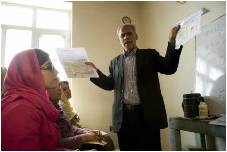Eastern Mediterranean network of age-friendly cities
 What is an age-friendly city?
What is an age-friendly city?
An age-friendly city encourages active ageing by optimizing opportunities for health, participation and security in order to enhance the quality of life as people age. In practical terms, an age-friendly city adapts its structures and services to be accessible to, and inclusive of, older people with varying needs and capacities
Is an age-friendly city only elderly-friendly?
No, because active ageing is a lifelong process. An age-friendly city is not just “elderly-friendly”, other groups benefit too. An age-friendly city should comprise:
barrier-free buildings and streets enhance the mobility and independence of people with disabilities, young as well as old
secure neighbourhoods allow children and younger women, as well as older people, to venture outside in confidence to participate in physically-active leisure and social activities
community support and health services
the participation of older people in voluntary or paid work.
Related documents
Global age-friendly cities guide
Checklist of essential features of age-friendly cities
WHO Global Network of Age-friendly Cities
The Dublin Declaration on Age-Friendly Cities and Communities [pdf 2.82kb]


